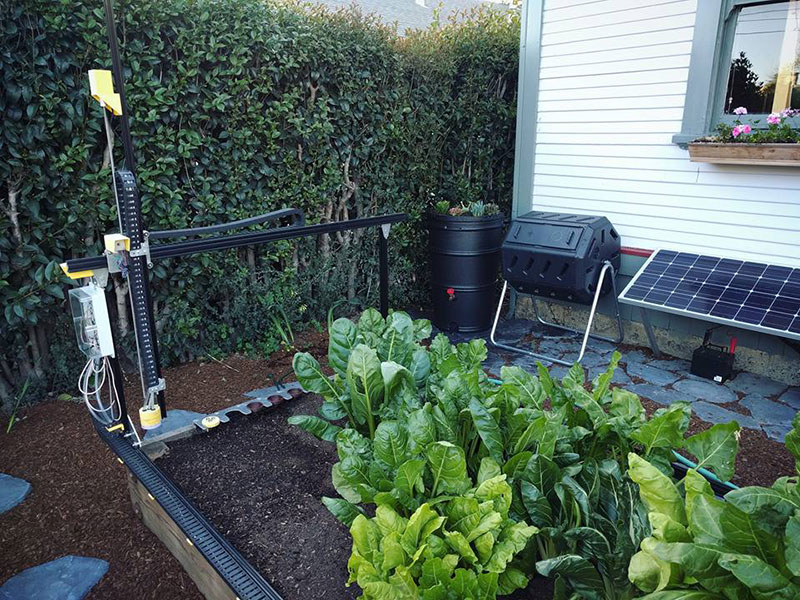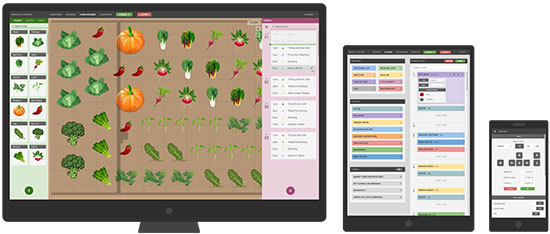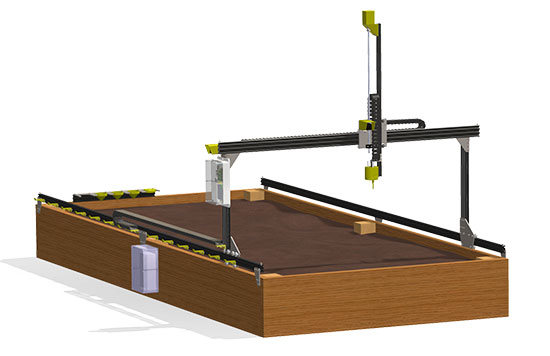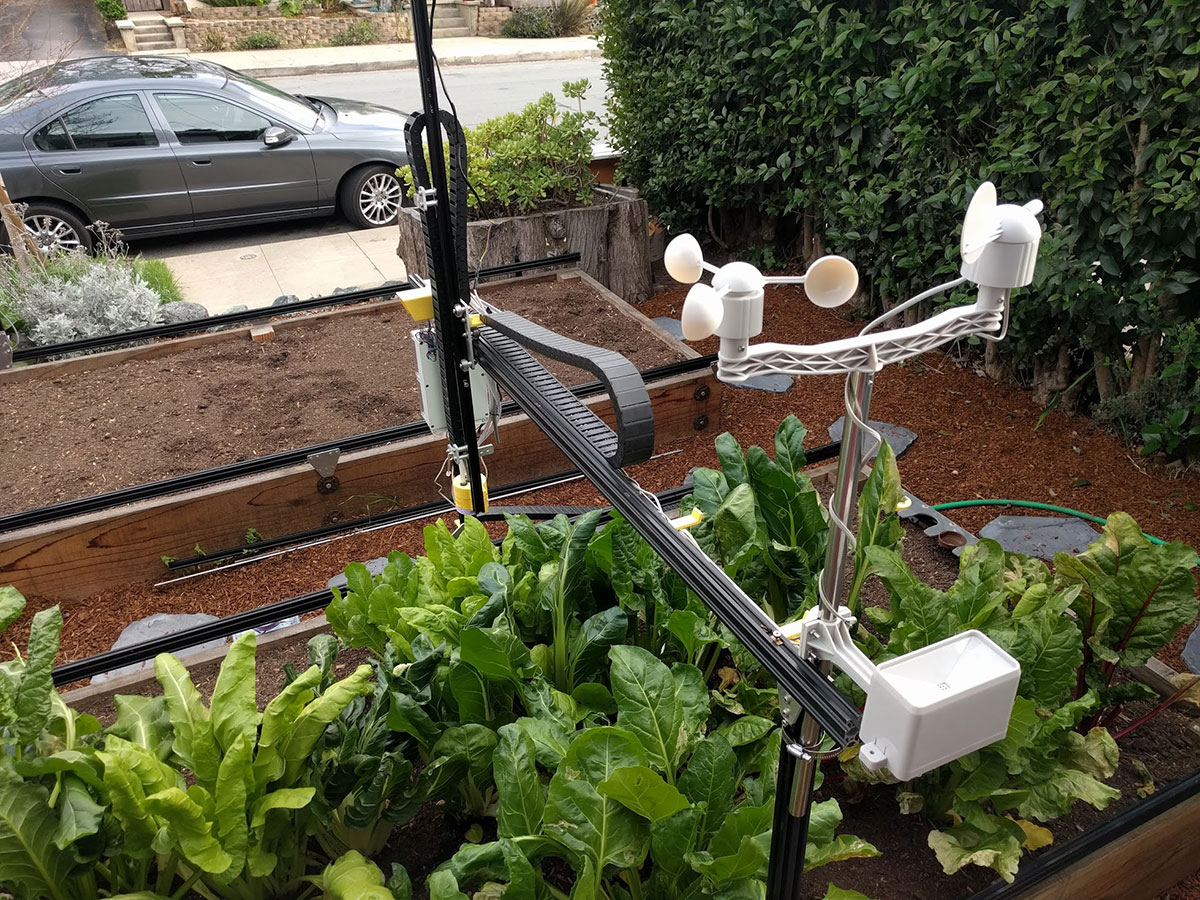The FarmBot Genesis Brings Precision Agriculture To Your Own Backyard
This open-source agbot will tend your perfect home garden.
The FarmBot Genesis Brings Precision Agriculture To Your Own Backyard
This open-source agbot will tend your perfect home garden.

Its ambitions might be smaller than the contraptions that can remotely plant miles of seeds, but Genesis looks incredibly impressive. Developed by a team of three from California, the kit is an autonomous machine that’s installed atop and around a small garden – in your backyard, on a rooftop, or inside a greenhouse or lab. Once built, Genesis performs nearly the entire gardening process prior to harvesting, including planting the seeds, watering each plant precisely and on a set schedule, monitoring conditions, and pulverizing pesky weeds. Check out how it works:
As the trailer shows, Genesis slides along tracks installed alongside the garden box, with the main arm also shifting left and right and popping down into the soil to perform its various functions. Once given instructions, FarmBot can be left to its own devices to follow the planting and watering schedules you picked until the veggies are ready to harvest.
While it’s a pretty high-tech contraption, the interface is very simple. The Internet-connected FarmBot is controlled via a web app that uses a Farmville-esque visual grid, letting you drag and drop the kind of plants you want into your digital garden. Genesis has 33 common crops loaded into its software so far (artichokes, chard, potatoes, peas, squash, etc) and it automatically spaces the varying plants appropriately, taking the guesswork out of having a diverse garden. And the app can be accessed from a computer, phone, or tablet, so you can tweak your plan from anywhere and send it to your backyard ‘bot.


What’s surprising is that Genesis is a fully open-source project. That means that the creators have released the source code for the software and the blueprints for all of the hardware pieces, so coders and engineers can easily modify Genesis and build their own parts. Many components can be made using 3D printers, and the software can be tweaked to add features – or improve those implemented by the company.
That open approach and focus on expandability also means that you can personalize Genesis for your garden layout and needs. For example, you can hook up a solar panel to power the ‘bot, or use a rain barrel to irrigate rather than connect a hose. Genesis is also something of a meteorologist: It monitors real-time weather conditions to better manage your garden.
Genesis is the first commercial version of this autonomous gardening idea, allowing for planting spaces up to 2.9 meters Á— 1.4 meters, with a maximum plant height of 0.5 meters. It’s an all-in-one kit with nearly everything you need to get started, including all the metal and 3D-printed pieces – the nozzles, motors, belts, and pulleys – a Raspberry Pi 3 computer, and plenty more. You’ll need to build your own planter bed following the specifications, as well as provide the water, electricity, and Internet sources. Programmer or engineering know-how not required: The kit comes with a step-by-step guide. If you can get through an IKEA furniture setup, you should be able to put together Genesis (fingers crossed). But if you’re a techie, you can do much more with it if you want.

The Genesis kit will begin pre-orders this Friday, July 1, although it’s unclear when FarmBot will start shipping – or exactly how much the kit will cost. A blog post on their site last week suggests that the all-in starting expense for Genesis will be about $3,500, but that includes things like shipping, infrastructure, soil, and other setup expenses. Meanwhile, a report from New Times SLO suggests that the kit itself will be sold at about $2,900, but creator Rory Aronson says they hope to eventually get the cost closer to $1,000 down the line.
It might be a pricey buy-in for now, but the Genesis kit is for early adopters who want the entire thing ready to install – and don’t mind riding the early wave of untested technology. Given the open-source approach, don’t be surprised if you can eventually buy different kinds of kits and supplement them with your own parts, expand upon the core kit with your own extra hardware, or even build your own FarmBot from scratch.
FarmBot’s documentation hints at ambitions for larger-scale farming ‘bots (imagine this technology on acreage!), so the Genesis kit could be just the beginning for this high-tech farming revolution.
Follow us

This work is licensed under a Creative Commons Attribution-NoDerivatives 4.0 International License.
Want to republish a Modern Farmer story?
We are happy for Modern Farmer stories to be shared, and encourage you to republish our articles for your audience. When doing so, we ask that you follow these guidelines:
Please credit us and our writers
For the author byline, please use “Author Name, Modern Farmer.” At the top of our stories, if on the web, please include this text and link: “This story was originally published by Modern Farmer.”
Please make sure to include a link back to either our home page or the article URL.
At the bottom of the story, please include the following text:
“Modern Farmer is a nonprofit initiative dedicated to raising awareness and catalyzing action at the intersection of food, agriculture, and society. Read more at <link>Modern Farmer</link>.”
Use our widget
We’d like to be able to track our stories, so we ask that if you republish our content, you do so using our widget (located on the left hand side of the article). The HTML code has a built-in tracker that tells us the data and domain where the story was published, as well as view counts.
Check the image requirements
It’s your responsibility to confirm you're licensed to republish images in our articles. Some images, such as those from commercial providers, don't allow their images to be republished without permission or payment. Copyright terms are generally listed in the image caption and attribution. You are welcome to omit our images or substitute with your own. Charts and interactive graphics follow the same rules.
Don’t change too much. Or, ask us first.
Articles must be republished in their entirety. It’s okay to change references to time (“today” to “yesterday”) or location (“Iowa City, IA” to “here”). But please keep everything else the same.
If you feel strongly that a more material edit needs to be made, get in touch with us at [email protected]. We’re happy to discuss it with the original author, but we must have prior approval for changes before publication.
Special cases
Extracts. You may run the first few lines or paragraphs of the article and then say: “Read the full article at Modern Farmer” with a link back to the original article.
Quotes. You may quote authors provided you include a link back to the article URL.
Translations. These require writer approval. To inquire about translation of a Modern Farmer article, contact us at [email protected]
Signed consent / copyright release forms. These are not required, provided you are following these guidelines.
Print. Articles can be republished in print under these same rules, with the exception that you do not need to include the links.
Tag us
When sharing the story on social media, please tag us using the following: - Twitter (@ModFarm) - Facebook (@ModernFarmerMedia) - Instagram (@modfarm)
Use our content respectfully
Modern Farmer is a nonprofit and as such we share our content for free and in good faith in order to reach new audiences. Respectfully,
No selling ads against our stories. It’s okay to put our stories on pages with ads.
Don’t republish our material wholesale, or automatically; you need to select stories to be republished individually.
You have no rights to sell, license, syndicate, or otherwise represent yourself as the authorized owner of our material to any third parties. This means that you cannot actively publish or submit our work for syndication to third party platforms or apps like Apple News or Google News. We understand that publishers cannot fully control when certain third parties automatically summarize or crawl content from publishers’ own sites.
Keep in touch
We want to hear from you if you love Modern Farmer content, have a collaboration idea, or anything else to share. As a nonprofit outlet, we work in service of our community and are always open to comments, feedback, and ideas. Contact us at [email protected].by Andrew Hayward, Modern Farmer
June 27, 2016
Modern Farmer Weekly
Solutions Hub
Innovations, ideas and inspiration. Actionable solutions for a resilient food system.
ExploreExplore other topics
Share With Us
We want to hear from Modern Farmer readers who have thoughtful commentary, actionable solutions, or helpful ideas to share.
SubmitNecessary cookies are absolutely essential for the website to function properly. This category only includes cookies that ensures basic functionalities and security features of the website. These cookies do not store any personal information.
Any cookies that may not be particularly necessary for the website to function and are used specifically to collect user personal data via analytics, ads, other embedded contents are termed as non-necessary cookies.